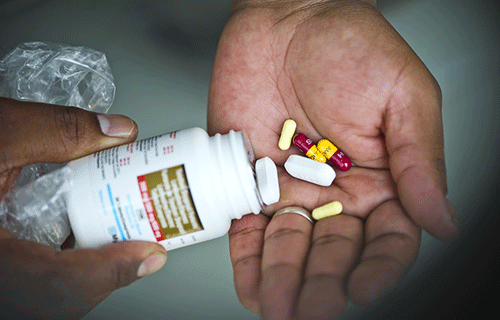The Central Procurement Board of Namibia is not holding back in defence of its decision to award a multimillion-dollar tender for the supply of antiretroviral medication to the Ministry of Health and Social Services.
The CPBN, alongside the ministers of health and finance and several pharmaceutical companies are being sued by Africure Pharmaceuticals Namibia, a company run by businessman Shapwa Kanyama.
In this suit, Africure, one of the successful bidders, wants the court to interdict the CPBN from entering into any procurement contracts with any of the successful bidders in a tender for the supply of antiretroviral (ARV) medication to the health ministry.
The contract in question is said to run for 12 months.
The company wants such an interdict to be in force until its review application is finalised by the courts.
Africure tendered to supply 19 types of ARV medication at the cost of N$342,7 million, however, the company only managed to secure a tender to supply only two types of ARV, at a total N$722 832.
CPBN selected Windhoek Medical Solutions to supply five of the types of ARVs valued at N$219.3 million.
In court documents, Kanyama claims that the CPBN did not take into consideration that his company, Africure is Namibian wholly owned, a local manufacturer of pharmaceuticals and a locally registered manufacturer of ARVs. Furthermore, the company has set up a factory to the tune of N$89 million employing 38 Namibians.
He said the CPBN also failed to apply the government’s directive on preferential procurement when it evaluated its bid.
Kanyama said Africure must have been treated in the same manner as FabuPharm, a local manufacturer which allegedly secured a tender to supply 38 pharmaceutical products worth N$458 million.
He went on to say that the company would suffer financial and irreparable harm should the contracts forge ahead, it would be forced to retrench the employees due to the small award as it would not be able to sustain their remuneration.
This is Africure’s second suit in relation to the said tender. The first case filed on 23 January was struck from the roll, for the company’s failure to properly serve those it was suing.
CPBN response
CPBN chairperson Amon Ngavetene in his replying affidavit said Africure is no longer supplying ARVs to the health ministry as its 2021 contract came to an end by influx of time on 1 February.
He said that based on the documents the company submitted, it is a “packer” and authorised to import medicine. Thus is not a local manufacturer of pharmaceutical products.
Ngavetene went on to say there were discrepancies in the information the company submitted.
“Its cost structure… demonstrates that the applicant (Africure) spends N$0.00 on direct labour and clerical wages; approximately N$10 million on management fees, and the balance of N$298 034 267 goes towards imports, VAT and excise fees,” explained Ngavetene.
He went on to say, “The applicant does not explain if it is a licensed manufacturer of goods in question, why it had to rely on a foreign supplier for the goods and spend N$0.00 on local employees in the process”.
Ngavetene further claims that Africure’s financial statements also do not reflect the N$89 million it claims to have used in the setting up of its local factory.
He said Africure would not suffer any prejudice if the interdict is not granted by the court as there would be no job losses nor loss of manufacturing capacity.
However, Ngavetene said should the interdict be granted, the public will suffer as there is no supplier for ARVs.
On the FabuPharm claims, Ngavetene said it was not part of the bidding process nor has it been cited in court documents.
Yesterday, Judge Kobus Miller postponed the matter to Thursday for Africure to sort out issues of parties that need to be joined to the suit.
- mamakali@nepc.com.na


